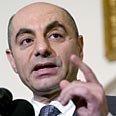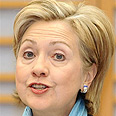

Moustapha, in an interview to official Syrian newspaper al-Thawra, said that the meeting could constitute a change in relations between Syria and the US and that "all of the big issues" are on the table.
But Secretary of State Hillary Rodham Clinton said after the meeting it is too early to tell if Washington and Damascus can improve frosty relations.
Clinton said the meeting was routine. But it was the first such session since September. The State Department has said the meeting reflects Clinton's interest in talking directly with Syria and other countries at odds with the United States.
After the meeting the State Department announced in a statement that "there remain key differences between our two governments, including our concerns about Syria's support to terrorist groups and networks, Syria's acquisition of nuclear and non-conventional weaponry, interference in Lebanon and worsening human rights situation," but added that "this meeting is an opportunity to use dialogue to discuss these concerns."
Syrian sources in Washington appear well aware of US concerns. Ahmed Salkini, a spokesman for the embassy, told the Washington Post that Syria has "learned from past experience to keep expectations low. Hopefully we will see a new approach to the region, based on mutual respect and dialogue," he added.
Syria's relationship with the US has been strained since former president George W. Bush's speeches on the 'Axis of Evil' in 2002. Following the murder of former Lebanese Prime Minister Rafik Hariri in 2005, which was widely blamed on Syrian forces, Washington recalled the US ambassador to Damascus and did not send a replacement since.
The last time a Syrian ambassador was called in to the State Department was in April 2008, in order to present before him evidence had been received that a missile site bombed by Israel in 2007 had been the site of a nuclear reactor.
Last week, a group of American Congress members, headed by Senator John Kerry, visited Damascus during a tour of the region. The group expressed American expectations that the Syrians would pressure Hamas to moderate their stance in order to achieve reconciliation with Palestinian President Mahmoud Abbas and his Fatah faction and allow the peace process to continue.















